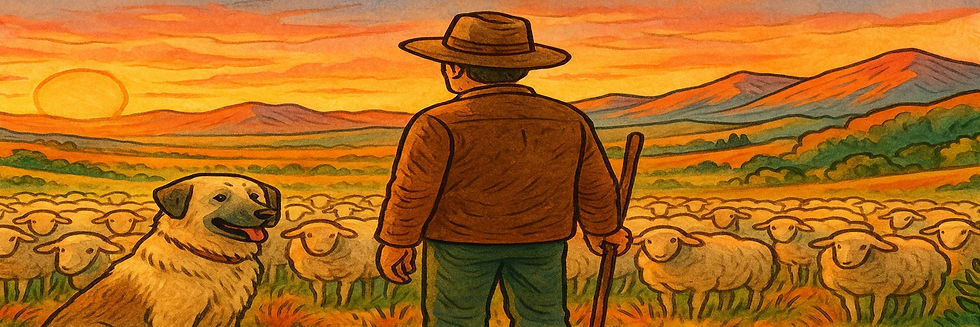Me Adapto a Cualquier Situación: Resilience and Challenges of Sheepherders on Colorado’s Western Slope
August 13, 2025
In early 2024, Project Protect Food Systems Workers deepened its partnership with the High Plains Intermountain Center for Agricultural Health and Safety (HICAHS) at Colorado State University to address safety concerns of sheepherders on Colorado’s Western Slope. As wolves are reintroduced in Colorado, sheepherders working in isolated, rugged terrain face new risks while tending their flocks in addition to the other dangerous wild animals they already contend with. In the summer of 2023, those dangers became painfully real when a sheepherder in western Colorado was attacked by a bear. According to Colorado Parks and Wildlife, the worker sustained bite wounds to the head, arm, and hand while protecting his sheep, requiring emergency airlifts to two hospitals for treatment.
Recognizing the need for practical safety measures, HICAHS provided Project Protect with canisters of bear spray to distribute directly to sheepherders. Bear spray is a proven deterrent that can give workers precious seconds to protect themselves in a wildlife encounter. For sheepherders stationed miles from the nearest road or town, this is more than a safety tool — it’s peace of mind in an unpredictable environment.



Describe your image

Describe your image

Describe your image

Describe your image

Describe your image

Describe your image

Describe your image

Describe your image
Leading this outreach on the Western Slope was Ignacio Alvarado, a longtime advocate for sheepherders and a former sheepherder himself. Ignacio knows firsthand the realities of living alone on the open range: the long hours, the harsh conditions, and the deep responsibility of caring for hundreds or even thousands of sheep. His background gives him a unique ability to connect with workers, earning their trust and opening the door to meaningful conversations about their needs.
In April and May 2024, Ignacio incorporated a brief oral survey into these outreach visits. The survey, conducted entirely in Spanish, asked sheepherders about their most pressing concerns, what they needed most, and what aspects of their work gave them pride. The visits took Ignacio across vast stretches of Bureau of Land Management land, ranch pastures, and mountain grazing areas — sometimes on treacherous dirt roads in remote areas. He located workers through his own knowledge of the trade, pulling up to isolated camps where a lone sheepherder and his dog kept watch over a flock.
Each visit served two purposes: to deliver resources like bear spray and educational materials on predator safety, and to document the voices of a workforce that is too often invisible. Every sheepherder approached agreed to participate, offering insights that paint a vivid picture of the challenges and strengths of this community.
Findings from the Field
Meeting Basic Needs: Many workers reported lacking fresh food, adequate clothing, and timely access to medical care. Employers are required under the H-2A program to provide essentials like food, water, and clothing, but sheepherders described delays and shortages. Requests for coats, medicine, and more nutritious food were common.
Weather, Water, and Wildlife: Sheepherders spoke about scarcity of water for themselves and their animals, unpredictable weather that could end work early, and the constant vigilance needed to protect sheep from predators. While many cited threats from bears, coyotes, and wolves, their concern was focused on keeping the flock safe — a responsibility tied directly to their livelihood.
Finances and Family Separation: Wages earned in Colorado support families abroad, but workers expressed the strain of being away from loved ones. Sending money home brought pride, yet also underscored the loneliness of range work.
Mental Health and Isolation: Despite their pride in their skill and adaptability — "I adapt to whatever situation" was a recurring sentiment — many sheepherders spoke of loneliness. Some wished for conversation, entertainment, or simply a break from the unchanging routine. Even so, moments like seeing a lamb take its first steps brought joy.



Describe your image

Describe your image

Describe your image

Describe your image

Describe your image

Describe your image

Describe your image

Describe your image
Why It Matters
These findings confirm what Project Protect’s Promotoras witness across the state in many agricultural worker groups: sheepherders are resilient, resourceful, and dedicated, but no one should have to rely on resilience alone to survive their work. Geographic isolation, language barriers, and under-enforced labor protections compound the risks they face. Without regular oversight, even legally mandated provisions for food, clothing, and communication equipment can go unmet.
For Ignacio, each interaction is an opportunity to bridge that gap — to bring both immediate tools, like bear spray, and longer-term support, such as information on workers’ rights and access to legal assistance. The 2024 outreach and data collection project is a reminder that effective support for agricultural workers must start with listening. By traveling to where sheepherders live and work, speaking their language, and respecting their expertise, Project Protect strengthens trust and gathers insights that cannot be obtained any other way.
As Colorado’s landscape continues to change, so too will the challenges of open-range work. Project Protect will keep working alongside partners like HICAHS to provide safety equipment, build awareness of wildlife risks, and advocate for systems that ensure sheepherders have the resources they need. These men care for the flocks that feed and clothe communities far beyond the Western Slope. It’s our responsibility to make sure someone is looking out for them, too.
You can read the full report published by the American Society of Agricultural and Biological Engineers here. If you have questions about this project or want to support our work, please contact Hunter Knapp at hunter@projectprotectfoodsystems.org.

Describe your image

Describe your image

Describe your image

Describe your image

Describe your image

Describe your image

Describe your image

Describe your image

Describe your image

Describe your image

Describe your image

Describe your image
